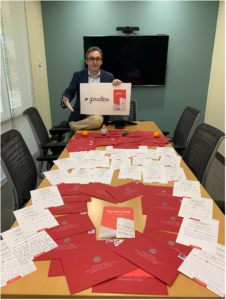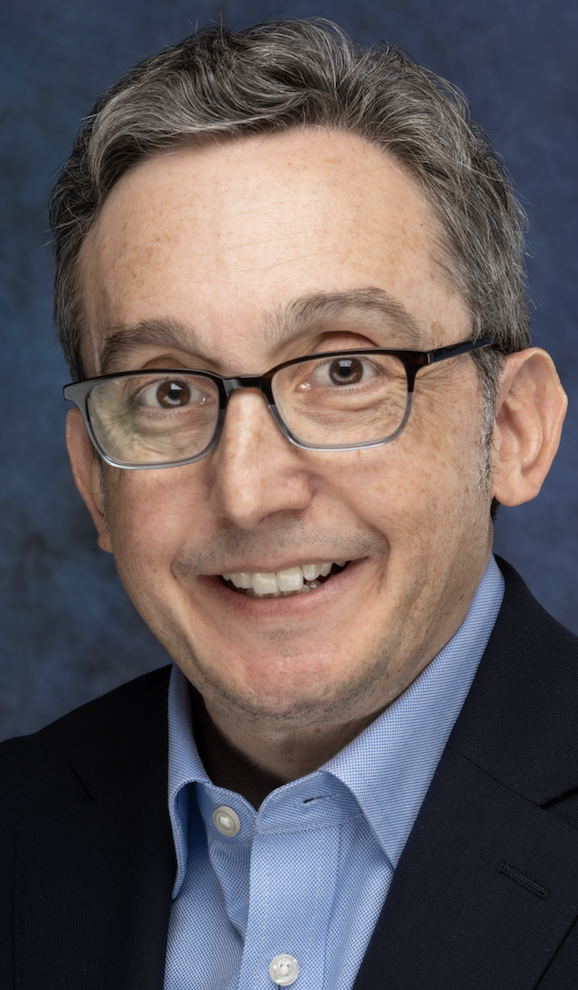An interview with Dr. Michael S. Okun from the Norman Fixel Institute at the University of Florida Health & Co Author of the book Ending Parkinson’s Disease: A Prescription for Action on December 26, 2023 by George Ackerman, Ph.D, J.D.

Biography
My name is Michael Okun, MD, and I am a board-certified neurologist, movement disorders specialist, neuroscientist and author who practices with the philosophy that ‘the patient is the sun’ and should be at the center of all care decisions.
I co-founded and co-direct the internationally-renowned Norman Fixel Institute for Neurological Diseases with my neurosurgeon partner and friend, Kelly Foote, MD. Since 2006, I have served as both the Medical Director and most recently as the Medical Advisor for the Parkinson’s Foundation.
I completed my medical degree in 1996 from the University of Florida. Following my medical degree, I completed my internship in 1997 and neurology residency in 2000, both at the University of Florida (Go Gators!). I then completed my fellowship in movement disorders and surgery for movement disorders in 2002 at Emory University in Atlanta, Georgia.
I see patients for a variety of movement related neurological disorders including Parkinson’s disease, tremor Tourette syndrome, dystonia and more. As a care provider, I strive to translate physiological principles underpinning neurological disorders into real-world therapies to improve a patient’s life and wellbeing.
When I am not caring for patients, I conduct human research including clinical trials and the cognitive, behavioral and mood effects of deep brain stimulation (DBS) and neuromodulation. My research projects have included the application of DBS and neuromodulation therapies for the treatment of Parkinson’s disease, Tourette syndrome and tic disorders, dystonia, essential tremor and obsessive-compulsive disorder. My research has received support from the National Institutes of Health, the Smallwood Foundation, the Tourette Association of America, the Parkinson’s Alliance, the Parkinson’s Foundation and the Michael J. Fox Foundation.
As a doctor, I am passionate about the importance of arts in medicine. In 1995, I authored my first book of poetry, Lessons From the Bedside. Since my first book, I have authored 14 books related to living a full life with neurological disorders including Parkinson’s Treatment: 10 Secrets to a Happier Life and Ending Parkinson’s Disease. I have also published more than 600 papers and review articles on Parkinson’s and other movement disorders.
In my free time, I enjoy spending time with friends and family, podcasts, reading history, going on walks with our family dog and watching baseball.
See https://neurology.ufl.edu/profile/okun-michael/ for more information.
Additional Positions:
Director
2019 – Current · Norman Fixel Institute for Neurological Diseases
Can you tell me more about The Norman Fixel Institute at the University of Florida Health?
The Norman Fixel Institute at the University of Florida Health is a global destination for patient care, research, training, think tanks, and centers of excellence programs. We care for people living with complex neurological diseases using an interdisciplinary approach. We believe that research can lead to real world impact. We embrace research projects and collaborations across the globe, and we focus on finding answers to improve lives.

What is your passion and how did you get involved in Parkinson’s awareness and hope for a cure?
My passion is simple. The person with Parkinson’s disease is the sun, and all care revolves around them and of course around their families. At Fixel, we believe that the best healthcare is tailored to the specific needs of a patient and that complex neurological disorders are best managed when specialists work side-by-side.
What type of goals do individuals with Parkinson’s have when working with you?
My philosophy for care is to be proactive, preventative, and practical. I work with each person with Parkinson’s to develop an individualized strategy that works for them. I never ‘require compliance’ or ‘get angry’ if someone does not follow my advice. The person with the disease is the ‘sun.’
What type of training and how long are the programs?
Every program we have for persons with Parkinson’s is custom made as no two people with Parkinson’s are the same. Additionally, a key to success is regularly checking in for advice and recalibration no matter what strategy you adopt.
What events do you participate in?
I have been the medical advisor and medical director for the Parkinson’s Foundation since 2006 and I have for many years made it a point to attend events with persons with Parkinson’s events as well as scientific events. To understand the disease, you need to spend as much time with the people affected as possible.
How can someone get in touch? What is your website?
Our website Fixel Institute website is: https://fixel.ufhealth.org/
The Parkinson’s Foundation website is: https://www.parkinson.org/
I also work with the amazing staff at the Parkinson’s Foundation on the free 1-800-4PDINFO Helpline. You can call and actually speak to a real person and if they can’t answer the question they will ask me. This effort was born from the original “Ask the Doctor” website I ran for many years at the Parkinson’s Foundation.
How can others also become advocates for awareness?
You can get involved and join the PD Avengers which is a group which has caught fire since the publication of our book Ending Parkinson’s Disease: A Prescription for Action: https://endingpd.org/
How do you measure success?
I measure success with one simple metric: ‘how many lives have we impacted.’
In your opinion what is the key to effective advocacy?
Collaboration fuels possibility and discovery. Great advocacy should amplify and summate ‘voices.’ Our White House red card campaign following the publication of our book, Ending Parkinson’s was one example of effective advocacy. Another example is the National Plan to End Parkinson’s Disease.
How can we better fundraise to support a cure for Parkinson’s?
Fundraising is simple. Do not ask for money. Tell your story.
Why should people who don’t have Parkinson’s care about this?
Parkinson’s disease is the now the fastest growing neurological disease. Everyone knows someone with Parkinson’s and there is a good chance it will one day affect your family and friends. We need to leave the next generation better than the last. I think these are compelling reasons for those without Parkinson’s disease to care.
Have you had any family members or relatives affected by Parkinson’s disease?
No, Parkinson’s disease does not run in my family, however I have many friends on every continent except of course Antarctica, who are currently battling this disease.
If you had one song that would tell us more about you or represent your life which song would it be?
The 1969 song written by George Harrison for the Beatles Abbey Road record. Here comes the sun…and I say it’s all right.
If you had one final statement or quote you could leave for the Parkinson’s community, what would it be?
The person with Parkinson’s disease is the sun, and all care revolves around them and of course around their families.

